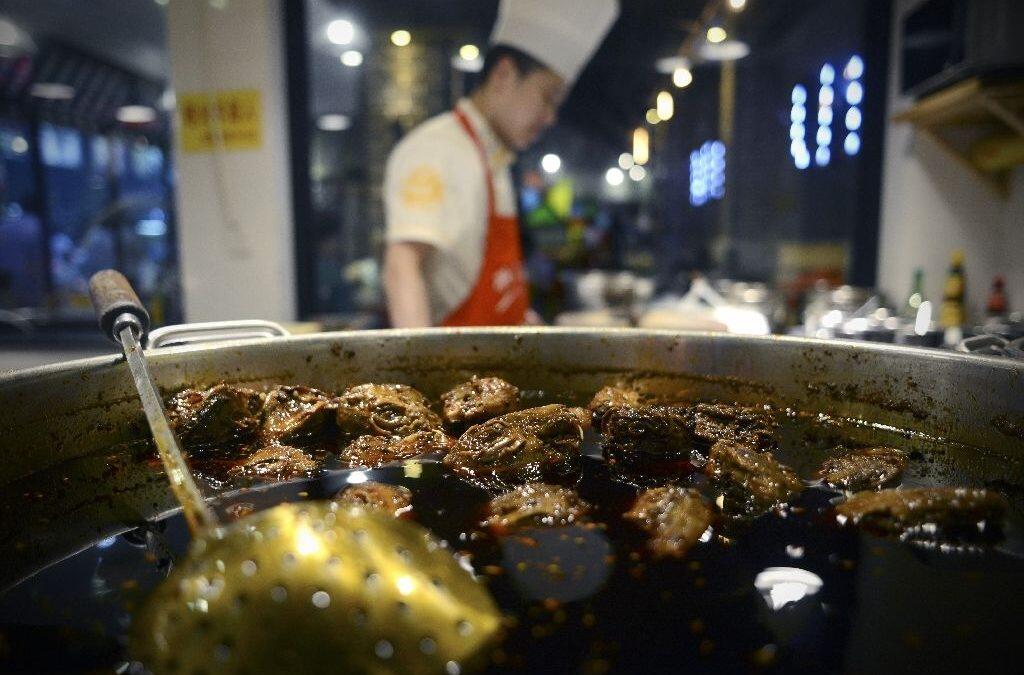Chinese diners greedily crack open delicate rabbit skulls and slurp down their contents, tucking into a delicacy so popular in one province that it has to import its supplies from France.
Sichuan is renowed for its spicy, peppery local dishes: one of its favourites is bunny brains, often eaten as a late night treat on the streets of its capital, Chengdu.
At the “Shuangliu Laoma Tutou”, a well-known restaurant in the heart of the city, dozens of customers use their gloved hands to prise open the skulls covered in sauce, suck out the brain and nibble on the cheeks amid cries of satisfaction.
“If Sichuanese people don’t eat spicy dishes every day, they’re unhappy,” said one 20-something woman surnamed Ma, as she dined with friends.
“I eat them at least once a week,” she added.
Westerners often avoid animal parts — duck beaks, chicken feet, heads and tripe — that Chinese gourmets treat as delicacies.
But even in China there is little appetite for rabbits’ meat, much less their heads, which are overwhelmingly eaten in Sichuan, a remote province long isolated by mountain ranges.
The dish is a speciality of the region — rarely found outside of a few popular restaurants in Beijing and other major cities.
“Two out of three rabbit heads consumed in China, are eaten in Sichuan,” said Wang Min, the manager of the Chengdu restaurant, adding that locals were proud of the snack.
“My parents and grandparents ate them. I’ve been enjoying them since my childhood”, she said, adding the tradition goes back several centuries.
“My friends in Guangxi (a southern province) and elsewhere don’t understand why we eat them,” she said, adding “they can’t stand the pepper.”
‘Grapple factor’
In Wang’s restaurant, head chef Yin Dingjun said the rabbit head recipe seemed simple but required a well-established technique.
“You have to drain the rabbits of their blood, then remove the guts” before marinating the head in a broth for several hours,” he said.
“Diners then use their teeth to gnaw at the flesh.”
Rabbits feature in Chinese mythology (a “jade rabbit” lives on the moon) and are regarded as cute by many young people rather than thought of as a delicacy, although in Sichuanese dialect eating rabbit head is slang for French kissing.
Although sucking on a rabbit head might seem odd to some diners even in China, it is par for the course in Sichuanese cuisine, Fuchsia Dunlop, a London-based expert in Chinese gastronomy told AFP.
“There are lots of spicy dishes, such as spicy duck heads, covered in chili and pepper,” she said.
For people in Sichuan, playing with your food is part of the fun, she said, adding they like “the grapple factor”.
“Using your fingers and teeth to get a little bit of meat, it’s part of the pleasure.”
‘Quite terrifying’
As night falls in Chendgu, innumerable stalls sell rabbit heads to locals who wash the treat down with beer.
“Night markets are part of our culture in Sichuan,” said Rong Lipeng, deputy chairman of Hage, China’s leading supplier of rabbit meat and products.
He sells more than eight million rabbit heads each year. But faced with a colossal local demand Chinese farms are struggling to supply enough.
As a result, nearly 20 per cent of rabbit heads marketed by the company are imported from Europe, mainly from Italy and France, and mostly frozen.
France exported 166 tonnes of meat and edible offal from rabbits to China in 2014, according to French government figures.
Hage, who says the heads are healthy since they contain little flesh, has now agreed a partnership with French firm Hycole to provide breeding rabbits to its farms in China, according to the French company’s manager Fabien Coisne.
He hopes that the taste for the treat will one day expand beyond Sichuan, but, he admits, the barrier is high.
“A lot of people outside our province do not dare taste them, because the rabbit heads do look quite terrifying.”
Source: AFP











